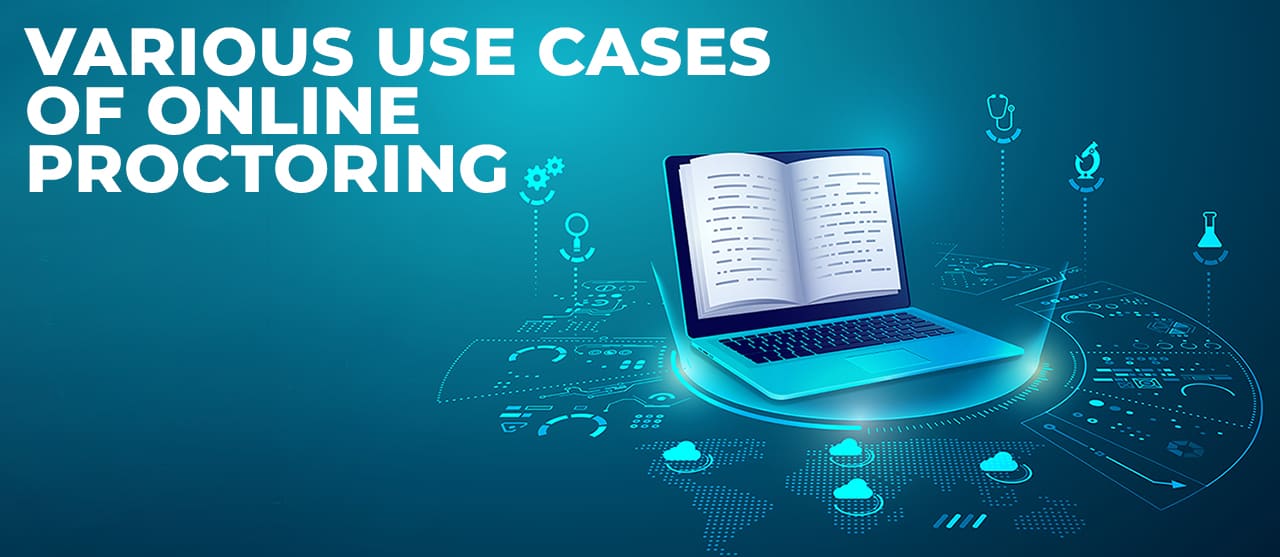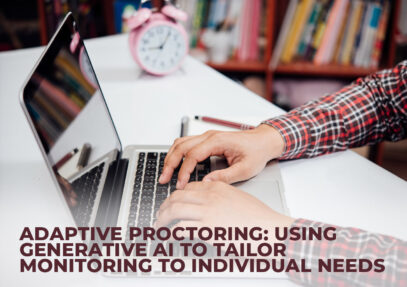
Although online proctoring is still an emerging space, several advantages make it an increasingly viable option for educational institutions. For one, it advances the notion of remote proctoring. Remote proctoring is a form of online testing commonly employed in educational institutions.
But it also has wide applicability when it comes to improving employee performance and evaluating the skills of those who cannot attend traditional, physical testing centers. To that end, this article sheds light on the most prominent benefits and use cases of online proctoring.
Benefits Of Remote Proctoring
- Cost-effective: Helps save on equipment, travel, and staff costs.
- Convenient: Students don’t have to leave their homes or travel to an unfamiliar place to take an exam.
- Secure: The online proctor can remotely monitor the exam-taker. Besides, the institution transparently lays out what information is being collected from the students and why.
Various Use Cases Of Online Proctoring
1. Health Sessions Under A Remote Proctored Mechanism (Telehealth Proctoring)
One use case of telehealth proctoring is for remote mental health consultations. A mental health provider can use a telehealth platform to conduct sessions with patients remotely, especially to accommodate cases where traveling and an in-person appointment isn’t feasible.
Telehealth proctoring can ensure that the session is secure and confidential, and the provider can monitor the patient’s engagement and behavior. This allows the provider to offer adequate care to the patient, even if they cannot meet in person.
2. Reduced Hassle For Conducting Online Entrance Exams
Education institutes looking to conduct online entrance exams for prospective students can use this technology to conduct assessments nationwide. The process of booking exam centers, administration, transportation, physical invigilation, etc., gets eliminated. This is especially viable in the era of remote and hybrid learning.
Essentially, with remote proctoring, the institute can conduct the exams remotely without in-person supervision. It allows students to take the exam on their own devices from their preferred location and reduces the administrative and financial load on the institutions.
The institute can use remote proctoring software to monitor the students during the exam and ensure that they follow the rules and regulations. The AI-powered solutions, in particular, can flag any suspicious activities and alert the proctors, who can take appropriate action.
The remote proctoring technology can also record the entire exam session for further review and analysis. This can help ensure the fairness and integrity of the exam. Overall, remote proctoring in online entrance exams can help institutes conduct exams securely and efficiently without needing physical infrastructure and invigilation.
3. Streamlined Employment Assessment
Organizations conducting employment tests for identifying and subsequently hiring prospective employees can rely on remote proctored tests. The organization can set up the test on the online proctoring platform, invite the candidates to take the test, and provide them with the necessary instructions and guidelines.
The platform will then monitor the candidates’ screens, webcams, and microphones during the test to ensure that they follow the rules and avoid engaging in fraudulent activities. This way, organizations can leverage real-time monitoring and surveillance capabilities to set up secure test environments, enable secure test-taking, and prevent test-takers from accessing unauthorized resources.
After the test is completed, organizations can review the results and use them as one of the criteria for evaluating the candidates’ suitability for the job. The online proctoring platform can provide detailed reports and analytics on test-takers performance, allowing the organization to make informed hiring decisions.
4. Skill-Based Training
Skill-based training organizations that offer final certificate exams can utilize remote proctoring processes to conduct their online exam cost-effectively. For example, a skill-based training organization that offers courses in software development may require its students to take a final certification exam to receive their certificate of completion. Instead of students visiting a physical testing center, the organization can utilize online proctoring services to conduct the exam remotely.
The organization can provide the students with a secure link to access the exam, and a proctor will monitor the students remotely using webcam and audio technology. This allows the organization to ensure the integrity of the exam and prevent any potential cheating while reducing the cost and inconvenience associated with physical testing centers – as elucidated above.
Additionally, the organization can also use online proctoring to conduct mid-course exams and assessments, allowing for more flexible and convenient testing options for their students. All these benefits serve well to:
- Enable continuous assessment of employee’s/student’s performance
- Drive effective on-the-job training and testing
- Complement the hybrid or remote nature of work and learning
Overall, online proctoring can provide a cost-effective and efficient solution for skill-based training organizations to conduct certification exams.
Conclusion
Online proctoring will continue to revolutionize the educational, healthcare, and corporate sectors. From conducting tests, assessments, and training to facilitating remote or hybrid learning and offering affordable options for students and employees, the benefits of this innovation are too good to be ignored. For more information about setting up an online proctoring practice at your organization or institution, connect with experts at EnFuse today.

















Comment